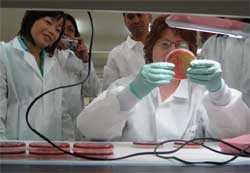Division of Bacterial Diseases (DBD) News Bulletin
This website is archived for historical purposes and is no longer being maintained or updated.
November 3, 2011: Content on this page kept for historical reasons.
In This Issue
Fall 2011
Invasive Bacterial Vaccine-Preventable Diseases Network
The Invasive Bacterial Vaccine-Preventable Diseases (IB-VPD) network is a laboratory-based surveillance network started by WHO about two years ago to support introduction of new conjugate vaccines for Streptococcus pneumoniae, Haemophilus influenzae type b and Neisseria meningitidis. The Division of Bacterial Diseases (DBD) serves as the Global Reference Laboratory (GRL) for this network, providing technical support to WHO headquarters and regional offices (AFRO, SEARO, WPRO, PAHO, EMRO and EURO). DBD laboratories have supported WHO regional reference labs (RRLs) in each of these regions to build capacity for detection, isolation and characterization of these organisms and to help them support countries in their regions to conduct surveillance.

Carla Talarico, from RDB’s Streptococcus Laboratory, demonstrating isolation and culture techniques of S. pneumoniae while working with trainees from the Western Pacific Region during a training course in Manila, Philippines.
Several DBD staff members are involved in GRL activities, with the Respiratory Diseases Branch’s Streptococcus Laboratory leading the effort, coordinating various training workshops and site visits with the Meningitis Laboratory from the Meningitis and Vaccine Preventable Diseases Branch. In its role as a WHO collaborating center, the Meningitis Lab recently revised and updated the Global Meningitis Laboratory Manual.
The GRL works closely with WHO and other global partners to overcome the challenges involved in improving invasive bacterial disease surveillance by providing ongoing support during training and site visits as well as regular correspondence with the RRLs, and providing assistance with critical supplies and reagents.
Challenges common among developing countries include lack of continuous power supply, inadequate specimen handling and transport conditions and limited supply chains for perishable reagents. Addressing these challenges is critical to strengthening surveillance capacity at the country level to generate the high quality data needed to support countries’ decisions for vaccine introduction and to demonstrate vaccine impact post introduction. In addition to providing technical assistance and collaborating with these laboratories, DBD provides epidemiologic expertise for WHO regional offices to enhance the quality of the surveillance data and support better data management, analysis and interpretation.
Recent IB-VPD network activities have included: a site visit and assessment of the Korea CDC
Laboratory which serves as RRL for the Western Pacific WHO region; conducting a training workshop for this region in Manila, Philippines in the spring of 2011 (see photo); a joint mission of the GRL and WHO headquarters to the Kenya RRL in Kilifi; sentinel site visits in Uganda; and a specialized training in molecular detection and characterization of agents of IB-VPDs at the Mongolia national laboratory. Ongoing activities include drafting global standard operating procedures in conjunction with WHO; performing quality control/quality assurance for the RRLs as needed; developing training tools such as clinical and laboratory IB-VPD posters for sentinel sites; and updating laboratory manuals.
Consistent with the division’s strategic goal of accelerating introduction of new vaccines in countries that need them the most in order to prevent deaths from pneumonia and meningitis and improve child health overall, despite the challenges, DBD remains committed to the IB-VPD network.
The GAVI Alliance announced it will provide funding for 16 more developing countries to introduce rotavirus vaccines and 18 more countries to introduce pneumococcal vaccines, noting that the roll out of rotavirus vaccines across Africa has already begun in Sudan. GAVI CEO Seth Berkley, MD said, “Thanks to our donors and partners, the GAVI Alliance is now delivering on its promise to protect more children across the developing world against rotavirus, pneumococcal disease and other life-threatening yet preventable diseases. The death toll of rotavirus and pneumococcal infections in Africa is particularly devastating, and this is where these vaccines will make the most significant impact, not only in lives saved, but also in terms of healthy lives lived. Immunization enables good health and healthy people are more productive and ultimately fuel economic growth.” GAVI also approved applications from five countries for pentavalent vaccine, and 12 for other types of vaccines. See detailed list of approved countries.
- Page last reviewed: November 3, 2011 (archived document)
- Content source:


 ShareCompartir
ShareCompartir